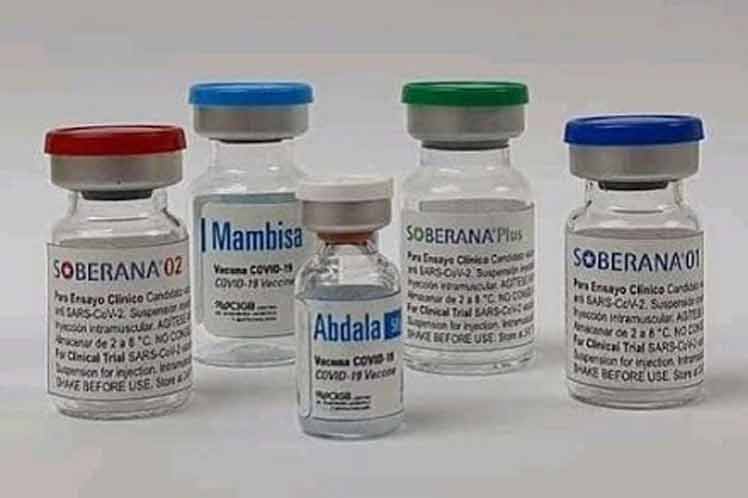RIO DE JANEIRO, BRAZIL – The efficacy achieved in clinical trials by two of Cuba’s formulas against covid-19, 62%, and 92%, is bringing closer the possibility of one of them becoming the first vaccine of this type developed in Latin America.
The preliminary results of the third and last stage of tests of the vaccine candidates Soberana 02 and Abdala were released between Saturday and Monday, unleashing euphoria in Cuba, which has bet everything on its own vaccines by not entering the W.H.O.’s Covax mechanism or buying them in the international market.

The World Health Organization (W.H.O.) establishes that for a vaccine candidate to be considered a vaccine, it must demonstrate an efficacy equal to or greater than 50%.
Soberana 02, from the Finlay Vaccine Institute (IFV), showed 62% efficacy with a two-dose schedule in a trial with 44,010 volunteers. At the same time, Abdala, from the Center for Genetic Engineering and Biotechnology (CIGB), was tested with a sample of 48,000 people in a three-dose schedule and reached 92.2% efficacy, according to data disclosed by these institutions.
Both are subunit vaccines based on the receptor-binding site (RBD) of the S protein of the virus. However, in the case of Soberana 02, this element binds to the inactivated tetanus virus to boost the body’s immune response.
EMERGENCY USE COMING SOON
“The efficacy of Abdala for symptomatic cases is an impressive index that is positioned at levels similar to those obtained with vaccines that use novel technologies such as messenger RNA or adenoviral vectors,” said Cuban molecular biologist and researcher at the University of the State of Sao Paulo (UNESP) Amilcar Pérez Riverol.
The scientist, a former CIGB researcher, stressed that the formulas “have already proven to be effective in reducing cases, hospitalizations and deaths” and added that the results obtained by Soberana 02 with two doses are a good indicator that suggests that with the application of a third dose of Soberana Plus (another of the Cuban candidates under investigation) “it should increase to rates close to or even higher than 80%”.
Read also: Check out our extensive coverage on Cuba
The responsible institutions have announced that they will shortly request emergency use from the Cuban regulatory body, the Center for State Control of Medicines, Equipment, and Medical Devices (Cecmed).
Both formulas are already being administered to tens of thousands of Cubans under the figure of health intervention studies and in parallel to clinical trials as a strategy to curb contagions on the island, which is going through the third and worst wave of the pandemic.
Once the green light is obtained from Cecmed, obtaining international validation of the two Cuban vaccines will begin.
“Almost all the other vaccines already approved made a well-detailed press dossier of the interim phase 3 analysis that led to the efficacy announcement. Therefore, this would be highly recommendable because it would not be necessary to wait the time required for publication in peer-reviewed scientific journals, which is usually longer,” the expert considered.
He also recalled that “the publication in this type of journal of the Phase 1/2 results” is still pending and warned that “it is vital that reviewable data begin to be available” on this type of platform. Later, “in a less immediate but critical period, the dossiers will be sent for certification by the World Health Organization,” explained Pérez Riverol.
CLEARING SUSPICIONS
Although these steps are not essential for the use of Cuban vaccines on the island, they would dispel the doubts of groups critical of the Cuban government that question the veracity of these results, especially given the serious crisis the country is going through.
That situation has translated into a rampant shortage of basic products, including medicines, which has led many to wonder how Cuba can develop vaccines when antibiotics and even aspirin are lacking.
“The lack of basic medicines is unfortunate because, like Covid-19, it has a profound impact on people’s health. But synthesizing an antibiotic and making a vaccine are different processes,” the scientist specified.
He recalled that Cuba has a track record of “more than 35 years of investment in human capital, experience in working with vaccines and investment in research infrastructure, development and production of vaccines and equipment associated with this type of technology”.
“This is what had allowed Cuba to be in perfect conditions to develop a vaccine against covid when the pandemic arrived,” without having to make a heavy investment or divert resources from other imports, he added.
Another “crucial” element, according to the expert, is that because of the state centralization, there is a “very strong intercommunication between all the institutions that can contribute to obtaining this result”, and at the same time between these institutions and the Ministry of Public Health. “Without that, it would not have been possible to carry out the clinical trials so quickly, and without clinical trials, you have nothing,” he added.
These results also open the door to potential exports of Soberana 02 and Abdala. Countries such as Argentina and Venezuela have already shown interest, in addition to Iran’s recent announcement that this week it would approve the emergency use of the former.

